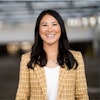Intellectual Expansion Through International Learning
Dr. Everette B. Penn
I can remember seeing a large paper map of the world in grade school. It showed the United States as a large body of land that seemed to
overshadow the entire world. The proud letters U-N-I-T-E-D S-T-A-T-E-S crossed the Appalachian Mountains and stretched to the Rocky Mountains and the California coastline. I had always known there were places such as Mexico, Canada and Europe, but the rest of the world was to me just masses of different colors and odd-sounding names spread around the map.
Africa, for example, was simply a faraway place constantly subjected to wars, famines, disasters and corrupt leadership. I thought then that the world was divided into two types of people: those I knew who lived in two-story houses, celebrated Christmas, wore pants and shirts and ate hamburgers and French fries; and those “other people” who lived “over there.”
It is this social divide that provided the impetus for the Fulbright Scholars program, which was founded in 1946 to build international cooperation and understanding. The program sends about 800 American scholars abroad annually to research and lecture throughout the world. It was as a member of this program that I served as a lecturer in the College of Law at Cairo University in Cairo, Egypt, during the spring semester of 2005.
During my unofficial ambassadorship to Egypt, I lived among and learned from Arabs, Christians, Egyptians and Muslims as I taught American Criminal Justice. The experience was very enriching for me, since students challenged our nation’s criminal justice system practices and issues of race, equality, democracy, imperialism and the occupation of Iraq and Afghanistan.
My learning continued outside of the classroom, as I conversed with taxi drivers, shop owners, professionals and everyday Egyptians — all of whom desired dialogue after learning I was an American. I was something of a novelty in Egypt, since many had never talked with an American, much less an African-American. My interactions moved listening to learning and learning to understanding!
I am able to infuse my Fulbright experience into the classroom, campus and community on an almost daily basis. I have organized a course called “Egypt in Transition,” which will consist of a 12-day international learning component in Egypt. And next year, I plan to take students to Morocco, Ghana and, of course, Egypt. I am also aiming to implement an international learning agenda on campus. My research agenda has improved by virtue of my Fulbright experience as well, as I have since authored several articles and am currently co-editing a book with another Fulbright Scholar who researched in South Africa.
Almost weekly, I am invited to lecture and to participate in symposiums and other cultural events in the greater Houston area. The Fulbright experience seems to be contagious, as I have piqued the interest of dozens of students and colleagues to pursue their own opportunities in the program.
Unfortunately, minority participation is consistently low throughout the range of Fulbright programs, specifically for African-Americans. Blacks make up less than 3 percent of the Fulbright scholarships awarded annually. A selection of Black scholars from the past includes Maya Angelou, Andrew Brimmer, John Hope Franklin, Harold McDougall, Ivory Nelson and Ruth Simmons.
We know that student and faculty participation in international programs depends on access. Those students and faculty who have been mentored by persons who have had an international learning experience are more likely to engage in one themselves. Thus, every institution of higher education should have an established international learning center that fosters, promotes and coordinates opportunities. This need is especially crucial at historically Black colleges and universities and Hispanic-serving institutions.
International skills and experiences are vital to our students as the world becomes globally interdependent. Our physical and cultural borders are being erased as technology improves communication, travel and business. So many of the world’s businesses now require international transactions, communication and cooperation that employees without an international educational experience may quickly become obsolete. For the college graduate of the 21st century, a new skill is required: the ability to function in multicultural and international environments.
— Dr. Everette B. Penn is a Fulbright Scholar and an assistant professor in the Departments of Criminology and Cross-Cultural Studies at the University of Houston-Clear Lake.
© Copyright 2005 by DiverseEducation.com





















